Fleurs du Mal Magazine


Or see the index
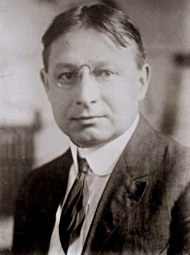
Ellis Parker Butler
(1869-1937)
An Exception
In all romances, old and new,
And in all lover’s rhymes
I find one rule that has held true
Since prehistoric times.
The lover must, if he indeed
Be hit by Cupid’s dart,
Grow pale, sigh much, neglect his food,
And wholly lose his heart.
Now fain would I abide this rule
But I, forsooth, grow red
And hot, and stammer like a fool,
And only lose my head.
Ellis Parker Butler poetry
fleursdumal.nl magazine
More in: Archive A-B, CLASSIC POETRY
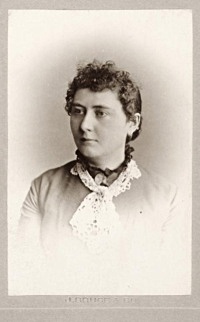
Isabella Valancy Crawford
(1850-1887)
His Sweetheart
Sylvia’s lattices were dark
Roses made them narrow.
In the dawn there came a Spark,
Armd with an arrow:
Blithe he burst by dewy spray,
Winged by bud and blossom,
All undaunted urged his way
Straight to Sylvia’s bosom.
‘Sylvia! Sylvia! Sylvia!’ he
Like a bee kept humming,
‘Wake, my sweeting; waken thee,
For thy Soldier’s coming!’
Sylvia sleeping in the dawn,
Dreams that Cupid’s trill is
Roses singing on the lawn,
Courting crested lilies.
Sylvia smiles and Sylvia sleeps,
Sylvia weeps and slumbers;
Cupid to her pink ear creeps,
Pipes his pretty numbers.
Sylvia dreams that bugles play,
Hears a martial drumming;
Sylvia springs to meet the day
With her Soldier coming.
Happy Sylvia, on thee wait
All the gracious graces!
Venus mild her cestus plait
Round thy lawns and laces!
Flora fling a flower most fair,
Hope a rainbow lend thee!
All the nymphs to Cupid dear
On this day befriend thee!
‘Sylvia! Sylvia! Sylvia!’ hear
How he keeps a-humming,
Laughing in her jewelled ear,
‘Sweet, thy Soldier’s coming!’
Isabella Valancy Crawford poetry
fleursdumal.nl magazine
More in: Archive C-D, CLASSIC POETRY
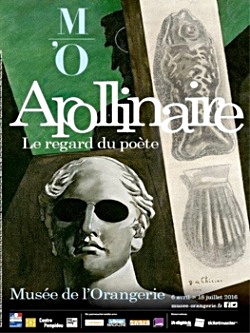 Musée de l’Orangerie, Paris
Musée de l’Orangerie, Paris
Apollinaire, the vision of the poet
Until 18 July 2016
The exhibition Apollinaire, the Eyes of the Poet looks at the period between 1902 and 1918 when Guillaume Apollinaire was active as an art critic. This period of fifteen years, seemingly a brief span, would in fact see a prodigious concentration of schools, manifestos, experiments and discoveries flourishing throughout the arts. Apollinaire’s character, his artistic sensitivity and his insatiable curiosity, made him a witness, a participant and a privileged intermediary in the turbulent times of the early 20th century. With a keen eye for discovering the art of his time, Apollinaire “defined once and for all the approach of artists like Matisse, Derain, Picasso and Chirico (…) using intellectual surveying techniques not seen since Baudelaire” Breton declared in 1952.
The aim of this exhibition is to recognise the important effect that this poet-critic’s discerning eye had on his era, in much the same way as Baudelaire and Mallarmé had on theirs.
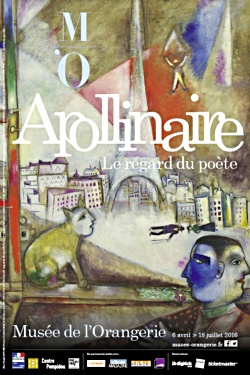 Poet, critic, friend of artists and one of the first to discover African arts, Apollinaire proved to be a key player in the aesthetic revolution that led to the birth of modern art.
Poet, critic, friend of artists and one of the first to discover African arts, Apollinaire proved to be a key player in the aesthetic revolution that led to the birth of modern art.
This exhibition aims to explore Apollinaire’s mental and aesthetic universe through a thematic display: from Douanier Rousseau to Matisse, Picasso, Braque and Delaunay, from Cubism to Orphism and Surrealism, from academic sources to modernity, from tribal arts to popular arts. One section will highlight in particular the poet’s links with Picasso.
The exhibition sits quite naturally in the Musée de l’Orangerie alongside the works collected by his friend Paul Guillaume, whom Apollinaire introduced into the avant-garde circles, and whose adviser he became.
Musée de l’Orangerie
Jardin des Tuileries
Place de la Concorde
Paris fr
+33 (0)1 44 77 80 07
+33 (0)1 44 50 43 00
Jours et horaires d’ouverture
Ouvert de 9h à 18h
Dernier accès : 17h15
Fermé le mardi
# Website: Le musée de l’Orangerie
fleursdumal.nl magazine
More in: Apollinaire, Guillaume, Archive A-B, Art & Literature News, Art Criticism, Exhibition Archive, FDM in Paris, SURREALISM
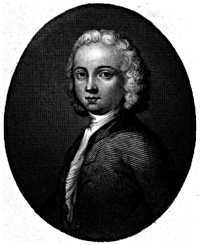
William Collins
(1721 – 1759)
A Song From Shakespeare’s Cymbeline
To fair Fidele’s grassy tomb
Soft maids and village hinds shall bring
Each op’ning sweet, of earliest bloom,
And rifle all the breathing spring.
No wailing ghost shall dare appear,
To vex with shrieks this quiet grove:
But shepherd lads assemble here,
And melting virgins own their love.
No wither’d witch shall here be seen,
No goblins lead their nightly crew:
The female fays shall haunt the green,
And dress thy grave with pearly dew!
The redbreast oft at ev’ning hours
Shall kindly lend his little aid:
With hoary moss, and gather’d flow’rs,
To deck the ground where thou art laid.
When howling winds, and beating rain,
In tempests shake the sylvan cell,
Or midst the chase on ev’ry plain,
The tender thought on thee shall dwell.
Each lonely scene shall thee restore,
For thee the tear be duly shed:
Belov’d, till life could charm no more;
And mourn’d, till Pity’s self be dead.
William Collins poetry
fleursdumal.nl magazine
More in: Archive C-D, CLASSIC POETRY, Shakespeare, William
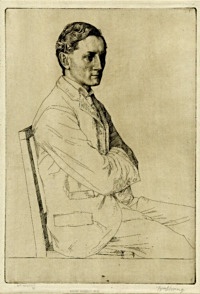
Sir Henry Newbolt
(1862-1938)
He Fell Among Thieves
Ye have robbd, said he, ye have slaughterd and made an end,
Take your ill-got plunder, and bury the dead:
What will ye more of your guest and sometime friend?
Blood for our blood, they said.
He laughd: If one may settle the score for five,
I am ready; but let the reckoning stand till day:
I have loved the sunlight as dearly as any alive.
You shall die at dawn, said they.
He flung his empty revolver down the slope,
He climbd alone to the Eastward edge of the trees;
All night long in a dream untroubled of hope
He brooded, clasping his knees.
He did not hear the monotonous roar that fills
The ravine where the Yassn river sullenly flows;
He did not see the starlight on the Laspur hills,
Or the far Afghan snows.
He saw the April noon on his books aglow,
The wistaria trailing in at the window wide;
He heard his fathers voice from the terrace below
Calling him down to ride.
He saw the gray little church across the park,
The mounds that hid the loved and honourd dead;
The Norman arch, the chancel softly dark,
The brasses black and red.
He saw the School Close, sunny and green,
The runner beside him, the stand by the parapet wall,
The distant tape, and the crowd roaring between,
His own name over all.
He saw the dark wainscot and timberd roof,
The long tables, and the faces merry and keen;
The College Eight and their trainer dining aloof,
The Dons on the dais serene.
He watchd the liners stem ploughing the foam,
He felt her trembling speed and the thrash of her screw.
He heard the passengers voices talking of home,
He saw the flag she flew.
And now it was dawn. He rose strong on his feet,
And strode to his ruind camp below the wood;
He drank the breath of the morning cool and sweet:
His murderers round him stood.
Light on the Laspur hills was broadening fast,
The blood-red snow-peaks chilld to a dazzling white;
He turnd, and saw the golden circle at last,
Cut by the Eastern height.
O glorious Life, Who dwellest in earth and sun,
I have lived, I praise and adore Thee.
A sword swept.
Over the pass the voices one by one
Faded, and the hill slept.
Sir Henry Newbolt poetry
fleursdumal.nl magazine
More in: Archive M-N, CLASSIC POETRY
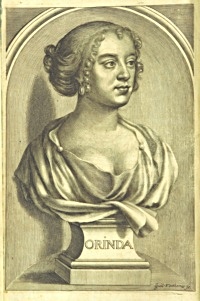
Katherine Philips
(1631-1664)
On the Welsh Language
If honor to an ancient name be due,
Or riches challenge it for one that’s new,
The British language claims in either sense
Both for its age, and for its opulence.
But all great things must be from us removed,
To be with higher reverence beloved.
So landskips which in prospects distant lie,
With greater wonder draw the pleasèd eye.
Is not great Troy to one dark ruin hurled?
Once the fam’d scene of all fighting world.
Where’s Athens now, to whom Rome learning owes,
And the safe laurels that adorned her brows?
A strange reverse of fate she did endure,
Never once greater, than she’s now obscure.
Even Rome her self can but some footsteps show
Of Scipio’s times, or those of Cicero.
And as the Roman and the Grecian state,
The British fell, the spoil of time and fate.
But though the language hath the beauty lost,
Yet she has still some great remains to boast.
For ’twas in that, the sacred bards of old,
In deathless numbers did their thoughts unfold.
In groves, by rivers, and on fertile plains,
They civilized and taught the listening swains;
Whilst with high raptures, and as great success,
Virtue they clothed in music’s charming dress.
This Merlin spoke, who in his gloomy cave,
Even Destiny her self seemed to enslave.
For to his sight the future time was known,
Much better than to others is their own;
And with such state, predictions from him fell,
As if he did decree, and not foretell.
This spoke King Arthur, who, if fame be true,
Could have compelled mankind to speak it too.
In this once Boadicca valor taught,
And spoke more nobly than her soldiers fought:
Tell me what hero could be more than she,
Who fell at once for fame and liberty?
Nor could a greater sacrifice belong,
Or to her children’s, or her country’s wrong.
This spoke Caractacus, who was so brave,
That to the Roman fortune check he gave:
And when their yoke he could decline no more,
He it so decently and nobly wore,
That Rome her self with blushes did believe,
A Britain would the law of honor give;
And hastily his chains away she threw,
Lest her own captive else should her subdue.
Katherine Philips poetry
fleursdumal.nl magazine
More in: Archive O-P, CLASSIC POETRY
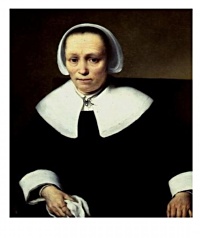
Anne Bradstreet
(1612-1672)
Before The Birth Of One Of Her Children
All things within this fading world hath end,
Adversity doth still our joys attend;
No ties so strong, no friends so dear and sweet,
But with death’s parting blow is sure to meet.
The sentence past is most irrevocable,
A common thing, yet oh, inevitable.
How soon, my Dear, death may my steps attend.
How soon’t may be thy lot to lose thy friend,
We both are ignorant, yet love bids me
These farewell lines to recommend to thee,
That when that knot’s untied that made us one,
I may seem thine, who in effect am none.
And if I see not half my days that’s due,
What nature would, God grant to yours and you;
The many faults that well you know
I have Let be interred in my oblivious grave;
If any worth or virtue were in me,
Let that live freshly in thy memory
And when thou feel’st no grief, as I no harms,
Yet love thy dead, who long lay in thine arms.
And when thy loss shall be repaid with gains
Look to my little babes, my dear remains.
And if thou love thyself, or loved’st me,
These O protect from step-dame’s injury.
And if chance to thine eyes shall bring this verse,
With some sad sighs honour my absent hearse;
And kiss this paper for thy love’s dear sake,
Who with salt tears this last farewell did take.
Anne Bradstreet poetry
fleursdumal.nl magazine
More in: Archive A-B, Bradstreet, Anne
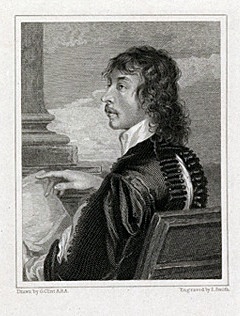
Thomas Carew
(1594-1640)
A Cruel Mistress
We read of kings and gods that kindly took
A pitcher fill’d with water from the brook ;
But I have daily tender’d without thanks
Rivers of tears that overflow their banks.
A slaughter’d bull will appease angry Jove,
A horse the Sun, a lamb the god of love,
But she disdains the spotless sacrifice
Of a pure heart, that at her altar lies.
Vesta is not displeased, if her chaste urn
Do with repaired fuel ever burn ;
But my saint frowns, though to her honour’d name
I consecrate a never-dying flame.
Th’ Assyrian king did none i’ th’ furnace throw
But those that to his image did not bow ;
With bended knees I daily worship her,
Yet she consumes her own idolater.
Of such a goddess no times leave record,
That burnt the temple where she was adored.
Thomas Carew poetry
fleursdumal.nl magazine
More in: Archive C-D, CLASSIC POETRY

Scenario voor een vermoeden
Zij die verbeiden worden oud. Eensluidend betoog
voor andere nachten. Uit gangen van verlangen
recepten voor een terugval. Hoe reëler de illusies,
hoe gretiger de mensen zijn. Met een wijder geheel
nog het blijst zijn mannen in aarzelende laarzen.
Er zijn er met gedachten van gummi, er zijn er
met gedachten van steen. En geen wijst een weg.
Bert Bevers
Uit: Eigen terrein – Gedichten 1998-2013, Uitgeverij WEL, Bergen op Zoom, 2013
fleursdumal.nl magazine
More in: Archive A-B, Bevers, Bert

Vachel Lindsay
(1879 – 1931)
Crickets On A Strike
The foolish queen of fairyland
From her milk-white throne in a lily-bell,
Gave command to her cricket-band
To play for her when the dew-drops fell.
But the cold dew spoiled their instruments
And they play for the foolish queen no more.
Instead those sturdy malcontents
Play sharps and flats in my kitchen floor.
Vachel Lindsay poetry
fleursdumal.nl magazine
More in: Archive K-L, CLASSIC POETRY, Lindsay, Vachel
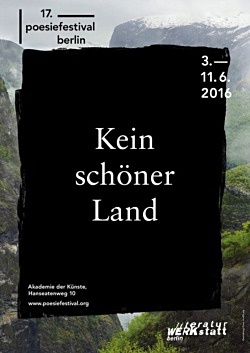 17. poesiefestival berlin: Kein schöner Land
17. poesiefestival berlin: Kein schöner Land
das 17. poesiefestival berlin stellt sich drängenden Fragen wie: Was ist das für ein Land, in dem wir leben und leben werden? Flucht und Migration verändern unsere Lebenswirklichkeit, und trotz aller Schwierigkeiten gewinnt Europa mit den Menschen, die aus aller Welt kommen, an Kulturen, Sprachen und Wort-Schätzen dazu. Das 17. poesiefestival berlin greift dies mit dem Motto „Kein schöner Land“ auf. Es findet vom 3. bis 11. Juni 2016 in der Akademie der Künste (Hanseatenweg 10) statt und gibt der internationalen Dichtkunst Bühne und Ort für Grenzüberschreitungen.
Eröffnet wird das 17. poesiefestival berlin: Kein schöner Land mit Weltklang – Nacht der Poesie, einem Konzert in verschiedenen Sprachen und mit internationalen Stimmen, darunter Caroline Bergvall (Norwegen), Luis Felipe Fabre (Mexiko), Gerhard Falkner, Uljana Wolf (Deutschland) und Ana Blandiana (Rumänien).
Poetry and conflict versammelt Dichterinnen und Dichter aus verschiedenen Kontinenten, die gesellschaftliche Realitäten ändern wollen – durch ihre Werke und Aktivitäten oder auch durch ihr Schweigen. Sie nahmen teil an Aufständen, an Kämpfen für Menschenrechte oder waren Zeugen von Kriegen: Gioconda Belli (Nicaragua), Bei Dao (China), Carolyn Forche (USA), Brian Turner (USA) und Gassan Zagtan (Palästina)
Mit Balkan Balcony holt das Festival Dichterinnen und Dichter nach Berlin, die den Balkan gemeinsam und jenseits nationalistischer Ideen neu diskutieren. Die Autoren, ihre Literaturen und Sprachen drifteten auseinander, so wie ihre Länder zuletzt im Jugoslawienkrieg. Es gibt Gräben zu überwinden. Erwartet werden Lindita Arapi (Albanien/Österreich), Kapka Kassabova (Bulgarien/UK), Damir Šodan (Kroatien/Niederlande), Ana Ristovi (Serbien), Theodoros Chiotis (Griechenland) und Aleš Šteger (Slowenien).
Schuberts „Die Winterreise“ wird mit Texten von Heiner Müller konfrontiert und aufgeführt von Corinna Harfouch und Nino Sandow.
Bei e.poesie verschmelzen elektronische Musik mit Poesie, Worte werden zu Beats. El Congo Allen, Kurator und Moderator des Abends, hat Kelvin Sholar (Pianist, Komponist/USA), Ryo Fujimoto (Musiker/Japan), Jimi Tenor (Musiker/Finnland), Jessie Kleemann (Autorin/Grönland) und Julian Herbert (Dichter, Musiker/Mexiko) gewinnen können.
Ein Dichter Abend wird gestaltet von und mit Monika Rinck.
17. poesiefestival berlin: Kein schöner Land
3.-11. Juni 2016
Akademie der Künste, Hanseatenweg 10, 10557 Berlin
Über das poesiefestival berlin: Das poesiefestival berlin ist das größte seiner Art in Europa und bringt jährlich rund 140 namhafte Dichterinnen und Dichter sowie Künstlerinnen und Künstler aus aller Welt nach Berlin. Neben dem Buch hat sich die Dichtkunst längst auch andere Präsentationsformen gesucht und experimentiert mit Theater, Performance, Musik, Tanz, Film und digitalen Medien. Das Festival macht Poesie in ihrer ganzen Formenvielfalt erlebbar und zählt bis zu 13500 Besucher jedes Jahr. Es findet seit 2000 statt, seit 2008 ist die Akademie der Künste (Hanseatenweg 10) Austragungsort des Festivals.
# Rückfragen und Informationen website POESIEFESTIVAL BERLIN
fleursdumal.nl magazine
More in: Art & Literature News, FDM in Berlin, Galerie Deutschland, Literary Events, MODERN POETRY, MUSIC
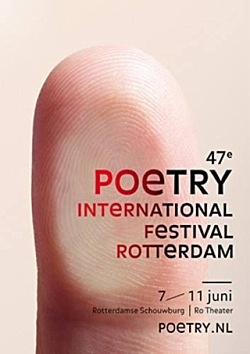 7 – 11 juni 2016 # Ro Theater & Rotterdamse Schouwburg #
7 – 11 juni 2016 # Ro Theater & Rotterdamse Schouwburg #
47e Poetry International Festival Rotterdam
Van 7 tot en met 11 juni kun je voor de 47e keer volop nieuwe dichters ontdekken en inspiratie opdoen tijdens het Poetry International Festival Rotterdam. Na vele jaren honkvast in de Rotterdamse Schouwburg beleeft het festival een bijzondere editie. Na de opening in de grote zaal verhuist het festival naar het sfeervolle Ro Theater. Daar, maar ook in en om de bruisende Witte de Withstraat, vind je een verrassende en uitdagende line-up van dichters van ver en ben je getuige van unieke voordrachten in vele talen, verdiepende specials, interview en debat in het dagelijkse Poëziecafé, vertaalprogramma’s en crossovers van poëzie met film, kunst, muziek en dit jaar ook strips.
Festival dichters: Laura Accerboni, Aase Berg, Anneke Brassinga, Sonja vom Brocke, Luis Chaves, Maarten van der Graaff, Esther Kinsky, Ruth Lasters, Sinéad Morrissey, Barbara Pogacnik, Sergio Raimondi, Lisa Robertson, Abdel-ilah Salhi , Andrej Sen-Senkov, Jeet Thayil, Răzvan Ţupa, Ann Vickery, Raúl Zurita
# Meer info op website POETRY INTERNATIONAL
fleursdumal.nl magazine
More in: #More Poetry Archives, Art & Literature News, Literary Events, Poetry International
Thank you for reading Fleurs du Mal - magazine for art & literature